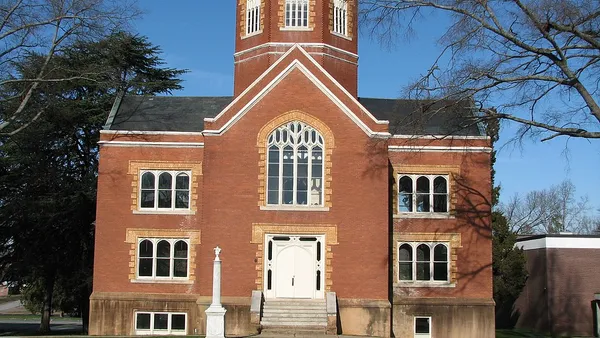Dive Brief:
- Undergraduate enrollment decreases deepened slightly as more schools shared their numbers with the National Student Clearinghouse Research Center, according to data released Thursday.
- Colleges reported 4.4% fewer undergraduates than a year ago as of Oct. 22, compared to a 4% lag as of late September. Graduate enrollment was up 2.9% in October, compared to 2.7% in September.
- The latest report accounts for 76% of institutions the Clearinghouse covers, or 13.6 million students. A final count will be available mid-December.
Dive Insight:
The fall enrollment picture is filling in as more colleges share data with the Clearinghouse. And while, overall, higher education enrollment is still down by about 3% from last fall, the latest release shows a few changes in how those losses are materializing.
The steepest declines continue to be among community colleges and first-year students, though their pace has eased as more colleges report numbers.
At for-profit colleges, earlier data indicated enrollment was up, but the latest numbers show it dropping. This is in part because for-profit colleges tend to have more flexible start dates than other institutions and so some that already reported are revising their numbers, Doug Shapiro, the center's executive director, said on a call with reporters Wednesday.
And graduate enrollment at four-year, private nonprofits grew slightly after appearing flat last month.
International students also continue to register declines, with a 15% decrease among undergraduates and a nearly 8% drop among graduate students. They were the only student group to experience declines in graduate enrollment.

Fall enrollment trends have been closely watched after reports early in the pandemic suggested colleges could see their student counts drop by as much as 20% year-over-year. While that hasn't occurred for most institutions — and some have even seen gains — where losses are reported is insightful.
For instance, while community college enrollment fell 9.5% year-over-year, enrollment at primarily online institutions rose 6%. Further, while undergraduate enrollment is decreasing across all age groups, it is growing at online-focused schools, both for traditional-age and adult learners.
This trend, particularly among adult learners, suggests schools that are already suited for online instruction "are in a better position to capture some of this disruption" than are community colleges, Shapiro said. Some observers expected community college enrollment to increase as a result of the pandemic-induced recession, though Shapiro is not ruling it out. Past Clearinghouse data shows it took a few years for significant gains from the last recession to appear.
The Clearinghouse defines primarily online schools as those with more than 90% of students exclusively in distance courses pre-pandemic. The latest report includes 26 such schools.















